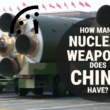Tradition, the enemy of disarmament
By Reshmi Kazi, May 16, 2014
Nuclear war and nuclear terrorism threaten women just as much as men. Indeed, women may be more susceptible than men to certain nuclear dangers, such as cancers associated with radiation. But women's influence over nuclear policy is dismally low. This holds true at both the national and international levels, and holds true in the realms of politics, military affairs, and science and technology.
In countries where women lack equal opportunity—where they are expected to remain submissive to men in all matters—it comes as no surprise that women lack political influence on nuclear questions. In India, women gained full suffrage in 1950. But women's representation in the Lok Sabha, the lower house of parliament, stands at only 11 percent, and legislation that would guarantee women 33 percent of seats in the Lok Sabha and in state legislatures has been stalled since 1996. In Pakistan, women gained the vote upon national independence in 1947, but women’s voting rights can face stiff opposition even today. Particularly in rural areas, it is often considered "un-Islamic" for women to vote.
Not all societies are quite so male-dominated, but it's hard to think of a country where women influence nuclear policy, or strategic and military decision making, in proportion to their numbers. Why? Well, one can argue with some validity that relatively few women possess the scientific background, military education, or experience in politics and diplomacy that are necessary to participate in nuclear weapons policy making. That is, one can argue that women aren't entitled to representation in nuclear decision making simply on the basis of being women.
But such reasoning only goes so far. In many countries, women's low influence in the political and security arena is based on gender stereotypes as much as on legitimate questions of women's experience. In the traditional households of many nations, the man has always been perceived as the chief. He has defined social and economic roles for other family members. He has projected strength, reason, prudence, and protection. Such stereotyping has carried over into modern political settings, where a (usually male) leader controls his followers and delegates roles for them. Women, meanwhile, are portrayed as weak, emotional, irrational, and requiring protection—incapable of making decisions for themselves or others.
This sort of “natural” differentiation between the sexes has permeated all aspects of nuclear policy making. For example, the Indian and Pakistani delegations to the 2013 Oslo conference on the humanitarian impacts of nuclear detonations contained no women. More broadly, if a man describes nuclear death and destruction with a clinical, abstract term such as “collateral damage,” his words convey a strong, confident, masculine message. If a woman uses a term such as "mass murder" to describe the same events, her words can convey an emotional, feminine message. The woman's words therefore become less worthwhile—even if they are more realistic.
Stereotypes aside, some research indicates that women are indeed less aggressive than men. A 2012 study published in Philosophical Transactions of the Royal Society concludes that “men are biologically programmed to be warriors.” In 2007, researchers from Brown University and elsewhere published the results of their research into people's responses to simulated war games. The research indicated that "high-testosterone individuals are more likely to engage in unprovoked attacks against their opponents." But if in fact it's true that women are more peace-loving than men—less conflict-prone, more humane and diplomatic—the rational response is to accelerate the disarmament process by ensuring women's participation in nuclear policy making.
Women have already played key roles in developing international instruments such as the Biological and Toxin Weapons Convention and the Chemical Weapons Convention. Women could play at least as crucial a role in nuclear disarmament. But it's hard for them to do so as long as diplomacy, dialogue, and a sense of interdependence among nations—the very things on which disarmament depends—are assigned low value due to their association with femininity. What's needed, ultimately, is for traditional concepts of power and strength to recede in policy making. Instead, the good of human beings should take center stage. Achieving sustainable peace depends on redressing inequalities of all kinds, including those between women and men.
On a more immediate level, how can women's influence on nuclear decision making be increased? I propose two sets of actions, one to be carried out by governments and another by women themselves.
Governments must recognize that women are important stakeholders in peace, conflict resolution, and nuclear disarmament. More specifically, governments should encourage women's direct involvement, at the international level, in nonproliferation and disarmament efforts. Also, when governments perform cost-benefit analysis for military expenditures, they should take into account the gender dimensions of these expenditures—for example, many perceive as irresponsible the Pakistani government’s decision to invest in research, development, and deployment strategies for tactical nuclear weapons. (With Pakistan suffering from poverty, poor public health, high unemployment, and low education levels, it makes little sense for Islamabad to incur huge defense expenditures for “small” nuclear weapons.) Additionally, governments should integrate into their nuclear policy deliberations the views of nongovernmental organizations such as the International Campaign to Abolish Nuclear Weapons, the Women's International League for Peace and Freedom, Reaching Critical Will, and Hibakusha Stories. Doing so would introduce into nuclear deliberations the humanitarian impact that a nuclear conflict would have on women and other sectors of the population.
Meanwhile, if women are to gain greater influence on nuclear policy, more female students must enter fields such as military planning, physics, arms control, and security. Women involved in medical research should study topics such as radiation's effect on human health—and then work to spread awareness of their findings. Women must also become more gender-conscious in their politics, and throw their support to women candidates who share their views on issues such as disarmament.
Due to geopolitical complexities, disarmament appears a distant dream today. But realizing the dream will become less far-fetched if women can exert their rightful influence over nuclear weapons policy.
Topics: Nuclear Weapons
Share: [addthis tool="addthis_inline_share_toolbox"]














